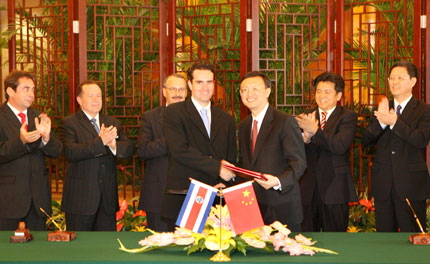China, Costa Rica set up diplomatic ties
(Xinhua/agencies)Updated: 2007-06-07 08:53
"It was the moment to take this decision," said Arias, speaking at the
Presidential House with top members of his cabinet. "China is a reality that we
can no longer ignore."
 Costa Rican President Oscar Arias, pictured in 2006, announced Wednesday that his country was establishing diplomatic relations with China. [AFP] |
He said his decision was based on the deep trade relationship between the two nations. Costa Rica exports more than US$1 billion of goods to China each year.
The joint communique was signed by Chinese Foreign Minister Yang Jiechi and Costa Rican Minister of Foreign Affairs Bruno Stagno Ugarte in Beijing on June 1.
The governments of the People's Republic of China and the Republic of Costa Rica, in accordance with the interests and aspiration of the peoples of the two countries, agree to establish diplomatic ties at ambassadorial level beginning June 1, 2007, the communique says.
"The Costa Rican government recognizes that there is only one China in the world and the government of the People's Republic of China is the sole legitimate government representing the whole China. Taiwan is an inalienable part of the Chinese territory," it says.
This leaves Taiwan with 24 allies, mostly small and poor nations, compared with more than 170 countries that recognise Beijing.
"The establishment of diplomatic ties is in the interest of the two countries
and people. It has paved the way for friendly and beneficial cooperation between
the two sides," Chinese Foreign Ministry spokeswoman Jiang Yu said at a regular
news conference in Beijing Thursday.
Jiang said Taiwan was the
"sole obstacle" confronting those countries. "We hope the relevant countries can
follow the trend of the times and make the right choice."
According to
the communique, Chinese and Costa Rican governments agree to develop friendly
cooperation based on the principles of mutual respect for sovereignty and
territorial integrity, mutual nonagression, non-interference in each other's
internal affairs, equality and mutual benefits, and peaceful coexistence.
Costa Rica is the 169th country that has diplomatic relations with China. It established "diplomatic ties" with Taiwan in 1941.
Latin America, the South Pacific and Africa are the main diplomatic battlegrounds for Beijing and Taipei.
But China's expanding political and economic strength has meant a steady increase in Taiwan's diplomatic isolation around the world.
In Taipei, officials earlier Wednesday said they were doing "everything within our power" to maintain diplomatic relations with Costa Rica.
At the World Health Organisation's assembly in May, Costa Rica voted "no" on Taiwan's membership bid.
Some 148 WHO member states rejected Taiwan's bid to join the body, while 17 others -- mainly Taiwan's allies -- supported it. Two countries abstained.
|
||
|
||
|
|

